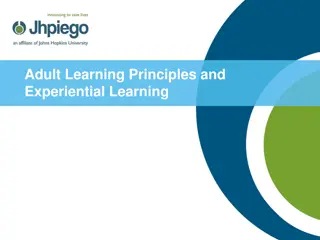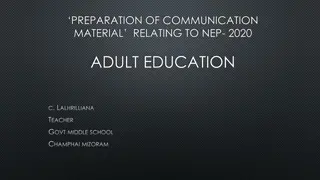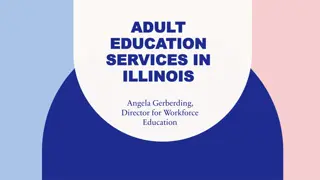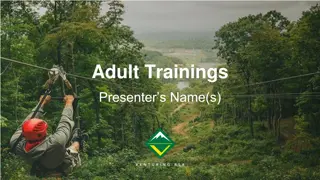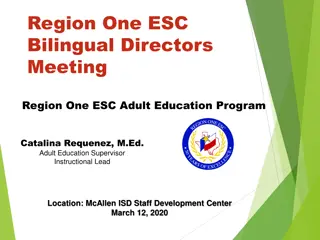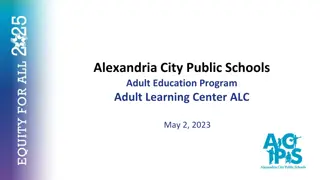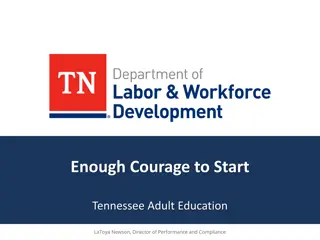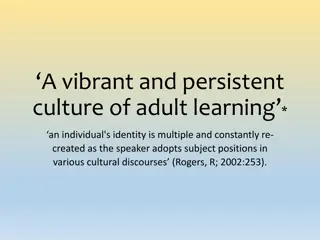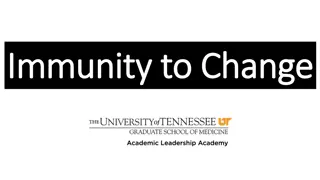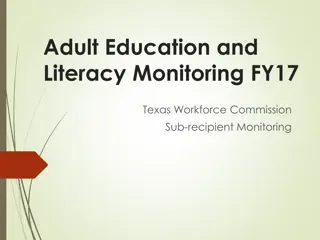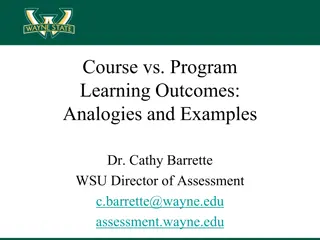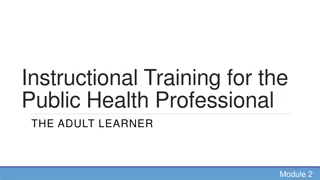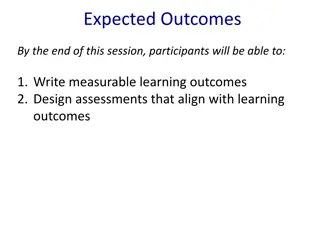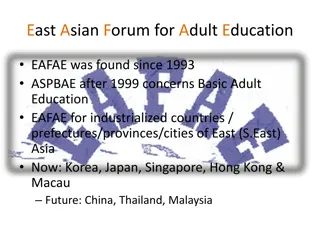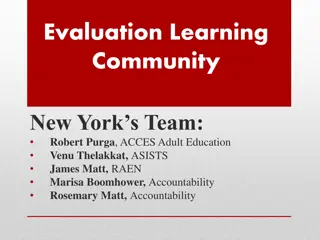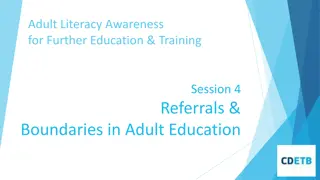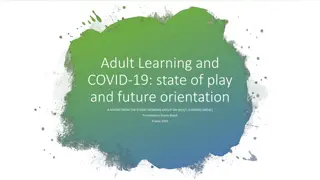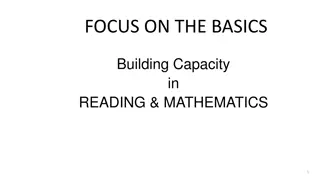Understanding Learning Outcomes in Adult Education: A Guide
Learning Outcomes (LOs) are statements of what trainees will learn, know, and be able to do upon completion of a program. This overview discusses the importance of LOs, how they differ from learning objectives, and provides practical tips on creating effective LOs by answering key questions and structuring them based on cognitive skills levels.
Download Presentation

Please find below an Image/Link to download the presentation.
The content on the website is provided AS IS for your information and personal use only. It may not be sold, licensed, or shared on other websites without obtaining consent from the author. Download presentation by click this link. If you encounter any issues during the download, it is possible that the publisher has removed the file from their server.
E N D
Presentation Transcript
Erasmus+ project Multi-purpose center for adult education in clean environment ECO-Center Tips on Learning Outcomes What are Learning Outcomes and how to create good Learning Outcomes 2014-1-BG01-KA204-001645
2014-1-BG01-KA204-001645 What is a Learning Outcome? Learning Outcomes (LOs) are Statements of what trainees will learn, will know, be able to do or be able to demonstrate when they have completed or participated in a programme / training path / course / project. Statements focused on trainees learning rather than instructor teaching Usually expressed as knowledge, skills, attitudes or values Statements that include a verb phrase and an impact phrase: what trainees will do/be able to do and how they will apply that skill or knowledge Statements specifying an action by the trainee that must be observable, measurable and able to be demonstrated
2014-1-BG01-KA204-001645 What is a Learning Outcome? Learning Outcomes vs. Learning Objective Learning Objectives Primarily specify topics to be covered tend to treat course material as the end Learning Outcomes focus on students intellectual growth and skill development tend to treat course material as the means transform and advance student learning Learning Outcomes are goals that describe how a student will be different because of a learning experience. More specifically, learning outcomes are the knowledge, skills, attitudes, and habits of mind that students take with them from a learning experience. (Suskie, 2009).
2014-1-BG01-KA204-001645 How to write a Learning Outcome? Before starting to formulate LOs answer the 5 questions What do you want the trainee to be able to do? What a trainee will be able to do with the information or experience gained? What knowledge, skill or abilities should the ideal trainee- participant demonstrate? How will trainees be able to demonstrate what they learned? How does these LOs fit within the LOs of the training institution?
2014-1-BG01-KA204-001645 How to write a Learning Outcome? Structuring the LO the DO s Express the Learning Outcome (LO) in a way that reflects cognitive skills Use the 5 levels cognitive skills scale (lowest to highest): Knowledge/remembering Comprehension/understanding Application/applying Analysis/analyzing Evaluation/evaluating Synthesis/creating
2014-1-BG01-KA204-001645 How to write a Learning Outcome? Structuring the LO the DO s Identify verbs to describe trainees learning: Knowledge/remembering define, list, recognize Comprehension/understanding: characterize, describe, explain, identify, locate, recognize, sort Application/applying: choose, demonstrate, implement, perform Analysis/analyzing: analyze, classify, compare, distinguish Evaluation/evaluating: assess, appraise, evaluate, rank, rate Synthesis/creating: construct, design, formulate, establish, combine
2014-1-BG01-KA204-001645 How to write a Learning Outcome? Structuring the LO the DO NOT s Avoid vague and not observable or measurable verbs: Understand Appreciate Know about Become familiar with Learn about Become aware of Personal goals are not necessarily LOs Expectations are not necessarily LOs
2014-1-BG01-KA204-001645 How to write a Learning Outcome? Structuring the LO Make Learning Outcomes specific and measurable Use action verbs that precisely demonstrate the abilities the trainees should achieve as a result of a course / training path / programme Create specific outcomes; it will be easier to measure how well those outcomes have been met Create specific outcomes; you will be able to more carefully map the direction your course / training path / programme is going The format tip: He/She will be able to [action verb] + [something]
2014-1-BG01-KA204-001645 How to write a Learning Outcome? Be sure the LO is S.M.A.R.T Specific - focused on a specific category of learning Measureable - data can be collected to measure trainee learning Attainable it is achievable given the educational experience Results - the LO is aligned with training Institution LOs Tailored - specifically tailored to the course / training path / programme
2014-1-BG01-KA204-001645 How are Learning Outcomes applied? LOs help trainees To be guided for how to direct their learning as well as the language to describe what they are learning, what they can do and what they know To articulate what they are learning and have learned from attending a course / training path / programme, inside and outside of a training setting To know where a course / training path / programme is going To better understand where they can go to learn particular knowledge, skills, attitudes or values To evaluate their progress toward reaching their goals To map where various learning opportunities are available throughout the training setting
2014-1-BG01-KA204-001645 How are Learning Outcomes applied? LOs help tutors To articulate the learning goals they would like trainees to achieve To plan the assessments needed to determine if the goals have been met To plan the activities, the amount of practice, and the materials trainees will need to reach these goals To focus their teaching To direct and motivate trainees
2014-1-BG01-KA204-001645 How are Learning Outcomes applied? LOs help institutions To understand how to better facilitate student learning To receive feedback on the following topics: The quality of the training services provided in respect to customer (trainee) satisfaction The skills trainees are learning The matching of the skills tutors want them to learn and the skills they are teaching them
2014-1-BG01-KA204-001645 After Learning Outcomes are created LOs Reference Checklist QUESTION YES NO Does the LO support the course / training path / programme objectives? Does the LO describe what the course / training path / programme intends for trainees to: Know (cognitive) Think (affective, attitudinal) do (behavioral, performance) Is the LO important/worthwhile Is the LO: Detailed and specific Measurable/identifiable A result of learning Do you have or can you create an activity to enable trainees to learn the desired LO Can the LO be used to make decisions on how to improve the course / training path / programme
and now Use these basic tips to make LOs ! On a subject you choose To target trainees you select For application in a training setting you prefer ECO-Center Team This project has been funded with support from the European Commission. This material reflects the views only of the author, and the Commission cannot be held responsible for any use which may be made of the information contained therein.


